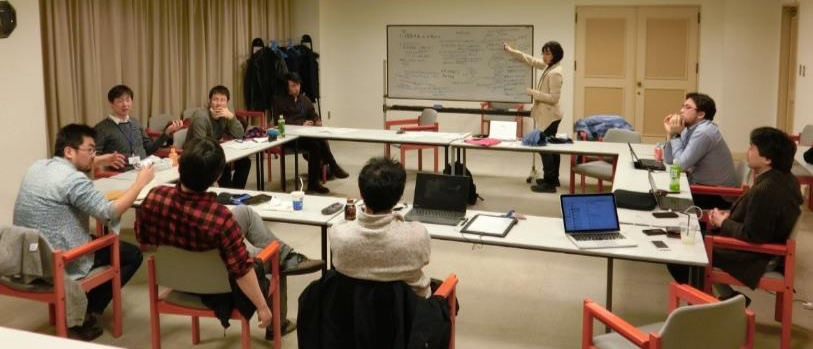AIR Newsletter Vol.3, No.1
本ニュースレターでは2015年12月から2016年5月までのAcceptable Intelligence with Responsibility (AIR)研究グループの活動を報告する。詳細はこちらを参照いただきたい。

アンケート調査報告
AIRとして活動を進めていく中で、他の研究者あるいはステイクホルダーが、人工知能が浸透する社会についてどのような考えを持っているのかのベースライン調査を行う必要があるのではないかとの提案があった。そこで、国立研究開発法人科学技術振興機構社会技術研究開発センター(JST-RISTEX)と協同で2025年の社会での「知的な機械・システム」に対するアンケート調査を実施した。
第1回調査は12月1日から7日で情報系、人文・社会科学系と政策系の学会や日本SF作家クラブのメーリングリスト、関連するFacebookグループに依頼メールを流したほか、シンポジウムでチラシを配布してウェブアンケート回答を依頼した。同時期に年齢を20代から60代をほぼ等分に、男女を250名ずつと指定し一般市民500名の回答をウェブ調査会社に依頼した。第2回調査は2016年2月1日から14日で、弁護士や出版物、番組などの編集・発行に携わっている人、そして宗教関係職に携わっている人など計500名の回答をウェブ調査会社に依頼した。第1回調査では坂本大輔氏、鳴海拓志氏、井上智洋氏、成原慧氏、長谷敏司氏、長倉克枝氏に各メーリングリストへの投稿などご協力いただいた。またアンケート調査にご協力いただきました皆様にこの場を借りて御礼申し上げる。
堀浩一氏インタビューと温故知新プロジェクト
第1回の土屋俊氏に続き、2016年3月1日(火)に東京大学本郷キャンパスにて堀浩一氏(東京大学大学院工学系研究科教授)にインタビューを行った。本インタビューは国際高等研究所の助成を受け、秋谷氏、大澤氏、大谷氏、神崎氏、久木田氏、本田氏、服部氏、江間の8名が参加した。インタビューは「AIR温故知新プロジェクト:オーラルヒストリーシリーズ」の第2弾として、書き起こしデータをウェブページで公開する予定である。(AIR 温故知新)。
「変なホテル」視察報告
AIRでは2016年以降、技術を協同開発することを目的としている。開発にあたっては、(1)共通アジェンダや社会ビジョンを抽出し、それを(2)具体的な現場の文脈に落とし込み、(3)実際に技術と人の相互作用がどのように行なわれているかを評価・観察し、それをさらに(1’)目指すべき社会のビジョンへとフィードバックするモデルを想定している。他分野の手法や視点への相互理解を深めるためメンバー内でフィードバックループを回していくことが重要である。また、フィードバックモデルそのものに対して(4)周辺の研究者や一般から評価を得て、(5)倫理・哲学や情報学など個別の分野へ貢献することだけではなく、異分野協同研究の方法論のアウトプットとすることも目的とする。 その第1弾として、2016年2月8日と9日に長崎県佐世保市ハウステンボス内「変なホテル」へ視察に伺った。「変なホテル」視察報告は別紙に掲載予定であり、本ニュースレターでは視察から得られた異分野協同研究への示唆を報告する。
第7回ワークショップ報告
2016年2月8日と9日にハウステンボスの会議室にて吉澤氏も加わってワークショップを開催した。主な議案は(1)「変なホテル」インタビューで各自が思ったことの意見交換、(2)2015年12月と2016年2月に行ったアンケート調査の議論、(3)オーラルヒストリー調査の位置づけと今後のインタビュー対象者の選定、(4)2016年以降の協同研究のテーマ決めである。
AIR Newsletter Vol.3, No.1
This newsletter reports four AIR activities over the December 2015 to May 2016 period.

1. Report: A stakeholder opinion survey about AI
We conducted a questionnaire survey about future relationships between humans and Artificial Intelligence in December 2015. As stakeholders, we collected data from AI researchers, social science and humanities (SSH) researchers, policy makers, science fiction (SF) writers, and the public. We identified eight scenarios in which AI could be introduced: driving, child nursing, elder care, life event decision-making, healthcare, creative activities, disaster prevention, and military activities. The results indicate that AI researchers and SF writers are enthusiastic whereas the public is neutral about society totally relying on machines in these scenarios. The results will be published at the Journal of Information Processing and management vol.59, No.5 2016.
2. Report: Interview and “Oral History Project”
On March 1st 2016, we interviewed Koichi Hori, a professor at School of Engineering, the University of Tokyo. The interview data will be uploaded soon in Japanese.
3. Report: Visiting a robot hotel: Henna Hotel
On February 8th-9th, we visited Henna Hotel (“wired hotel”) where robots work as staff at the check in counter and concierge. We found that hotel’s vision (“keep changing”) requires creativity and reconstruction of the interior of the hotel, and upgrading of the skill of the staff and the robots they introduce. We also found that the interaction between robots and humans (staff and guests) requires flexibility and acceptance to some extent. This visiting report will be published in the Information processing Society of Japan Magazine Vol. 57, No. 11, 2016.
4. Report: 7th Workshop of AIR
On February 8th-9th, we held the 7th Workshop of AIR. We decided to build a prototype of a chatterbot that determine the user’s ethical variety as for our project 2016.